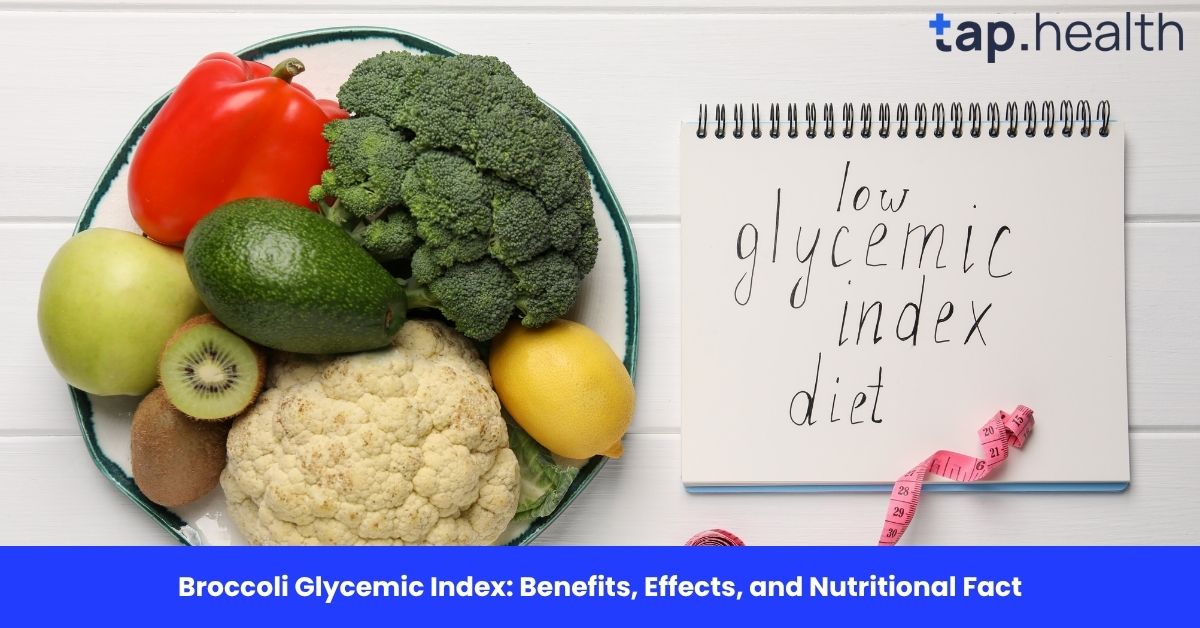Broccoli, often referred to as a superfood, is widely recognised for its nutritional value and health benefits. Whether you’re looking to manage your blood sugar or add more fibre and vitamins to your diet, this green vegetable is a great choice. However, if you’re concerned about your blood sugar levels or following a diabetes-friendly diet, you may be wondering: What is the glycemic index (GI) of broccoli, and how does it affect blood sugar?
In this article, we will explore the glycemic index of broccoli, its impact on your health, particularly for blood sugar management, and how to incorporate it into your daily meals. We’ll break down everything you need to know to help you make informed decisions about including this vegetable in your diet.
What is Glycemic Index (GI)?
Before diving into the glycemic index of broccoli, let’s understand what glycemic index (GI) is. The GI is a ranking system that measures how quickly a food raises blood sugar levels after consumption. It is measured on a scale of 0 to 100, where:
- Low GI (0-55) foods raise blood sugar slowly.
- Medium GI (56-69) foods cause a moderate increase in blood sugar.
- High GI (70 and above) foods lead to a rapid increase in blood sugar.
Low-GI foods are typically preferred for maintaining stable blood sugar levels, particularly for individuals with diabetes. They help in avoiding sudden insulin spikes and crashes, making them a better choice for overall health.
What is the Glycemic Index of Broccoli?
Broccoli is considered a low-GI food, with a glycemic index of 15. This means that it has a minimal impact on blood sugar levels when consumed. Since it falls into the low-GI category, it is an excellent choice for individuals with diabetes, those aiming for weight loss, or anyone interested in managing their blood sugar levels naturally.
Broccoli is not only low in carbohydrates but also rich in fibre, which further helps slow down the absorption of sugars, ensuring a gradual rise in blood sugar rather than a rapid spike.
Why is the GI of Broccoli So Low?
The low glycemic index of broccoli can be attributed to several factors:
- Low Carbohydrate Content: Broccoli contains a very small amount of carbohydrates, making it unlikely to cause a significant increase in blood sugar.
- High Fibre Content: The high fibre content in broccoli slows the absorption of glucose into the bloodstream, contributing to its low GI.
- Rich in Water: Broccoli is made up of about 90% water, which also reduces its glycemic impact by diluting the effect of sugars.
Health Benefits of Broccoli
In addition to its low glycemic index, broccoli is a powerhouse of nutrients that offers several health benefits. Here are some of the key health benefits of adding broccoli to your diet:
1. High in Nutrients
Broccoli is packed with essential nutrients, including:
- Vitamins: It is a rich source of vitamin C, which supports immune health and aids in collagen production for healthy skin. It also contains vitamin K, which plays a crucial role in bone health and wound healing.
- Minerals: Broccoli is a good source of potassium, which helps regulate blood pressure, and calcium, which is vital for bone strength.
- Folate: This B-vitamin is important for cell function and tissue growth, making it especially crucial for pregnant women.
- Antioxidants: It contains sulforaphane and lutein, which have anti-inflammatory and antioxidant properties that may help protect against chronic diseases.
2. Supports Digestive Health
Broccoli is rich in dietary fibre, which is essential for good digestion. Fibre helps to maintain bowel regularity, prevent constipation, and promote a healthy gut microbiome. Additionally, the fibre in broccoli can help reduce bloating and support overall digestive health.
3. Boosts Immune System
Broccoli’s high content of vitamin C, vitamin A, and sulforaphane makes it an excellent immune booster. These nutrients help protect the body against infections and enhance immune function.
4. Promotes Heart Health
Broccoli is heart-healthy thanks to its fibre, potassium, and antioxidant content. Fibre helps lower cholesterol levels, while potassium helps regulate blood pressure. Antioxidants, such as sulforaphane, can reduce inflammation and protect against oxidative stress, a key factor in cardiovascular diseases.
5. Supports Weight Loss
Broccoli is low in calories and high in fibre, making it an ideal vegetable for those looking to lose weight. The fibre in broccoli helps you feel fuller for longer, reducing the likelihood of overeating. Additionally, its low glycemic index ensures that it does not cause significant spikes in blood sugar or insulin, which are often linked to weight gain.
How Broccoli Affects Blood Sugar Levels
As mentioned, broccoli has a low glycemic index and is unlikely to cause significant fluctuations in blood sugar. This makes it an excellent choice for individuals looking to manage blood sugar levels, especially those with diabetes or insulin resistance.
1. Prevents Insulin Spikes
Since broccoli releases its sugars slowly into the bloodstream, it helps prevent the rapid spikes in insulin that can occur after eating high-GI foods. This is crucial for people with type 2 diabetes, as high insulin levels can lead to insulin resistance over time.
2. Improves Insulin Sensitivity
Regular consumption of low-GI foods like broccoli can help improve insulin sensitivity, which means that the body becomes more efficient at using insulin to regulate blood sugar levels. This is beneficial for people with pre-diabetes or those at risk of developing type 2 diabetes.
3. Supports Metabolic Health
By stabilising blood sugar levels, broccoli helps to maintain a healthy metabolism. It can prevent blood sugar crashes that can lead to cravings and overeating, which are often linked to weight gain.
Broccoli in a Diabetic Diet
Broccoli is an ideal addition to a diabetic-friendly diet due to its low glycemic index and health benefits. Here are a few tips for incorporating broccoli into your meals:
1. Pair with Protein or Healthy Fats
For a balanced meal, pair broccoli with a source of protein (like chicken, tofu, or lentils) or healthy fats (like olive oil or avocado). This will slow down the digestion of carbohydrates and further stabilise blood sugar levels.
2. Steamed or Raw
Both steamed and raw broccoli have their benefits. Steaming broccoli preserves many of its nutrients, including vitamin C, while raw broccoli provides additional fibre. You can include it in salads, smoothies, or as a side dish.
3. Avoid Overcooking
Overcooking broccoli can cause it to lose some of its beneficial nutrients, including vitamin C. To maximise its health benefits, avoid cooking broccoli for too long, and opt for steaming or lightly sautéing it instead.
Broccoli vs Other Vegetables: Glycemic Index Comparison
Broccoli’s low glycemic index makes it one of the best vegetable choices for managing blood sugar. Let’s compare the GI of broccoli with some other common vegetables:
| Vegetable | Glycemic Index (GI) |
|---|---|
| Broccoli | 15 |
| Spinach | 15 |
| Cauliflower | 15 |
| Carrots (raw) | 16 |
| Potatoes (boiled) | 78 |
| Corn | 52 |
As you can see, broccoli, along with other leafy greens like spinach and cauliflower, has a very low GI, making it an excellent choice for blood sugar control. In contrast, foods like boiled potatoes have a high GI and should be consumed in moderation.
How to Include Broccoli in Your Diet
Broccoli is a versatile vegetable that can be incorporated into your meals in several ways. Here are a few ideas for enjoying broccoli:
1. In Salads
Add raw broccoli florets to your salads for a crunchy texture and a nutrient boost. You can combine it with other vegetables like tomatoes, cucumber, and bell peppers for a colourful, healthy dish.
2. As a Side Dish
Steamed broccoli with a sprinkle of lemon juice or a drizzle of olive oil makes for a simple and nutritious side dish. You can also sauté it with garlic and herbs for added flavour.
3. In Smoothies
Blend broccoli into your green smoothies along with other fruits and vegetables like spinach, banana, and apple. It’s an easy way to add fibre and vitamins to your diet.
4. In Soups
Broccoli can be added to soups and stews for added texture and nutrition. A creamy broccoli soup made with low-fat milk or plant-based milk is both delicious and healthy.
Key Takeaways
- Broccoli Glycemic Index: Broccoli has a glycemic index of 15, making it a low-GI food that has minimal impact on blood sugar levels.
- Health Benefits: Rich in vitamins, minerals, antioxidants, and fibre, broccoli supports immune function, digestive health, heart health, and weight management.
- Blood Sugar Control: Due to its low GI, broccoli helps stabilise blood sugar levels, making it an excellent choice for people with diabetes or anyone looking to manage their blood sugar.
- Incorporation in Diet: Broccoli is versatile and can be enjoyed raw, steamed, sautéed, or in soups, salads, and smoothies.
FAQ on Broccoli Glycemic Index
Q1: What is the glycemic index of broccoli?
The glycemic index of broccoli is 15, which classifies it as a low-GI food. This means it has a minimal effect on blood sugar levels.
Q2: Can broccoli help lower blood sugar?
Yes, broccoli can help lower blood sugar levels by providing a slow and steady release of glucose into the bloodstream, preventing rapid spikes in blood sugar.
Q3: How does broccoli affect insulin levels?
Broccoli helps improve insulin sensitivity, allowing the body to use insulin more efficiently to regulate blood sugar, making it a good food choice for managing diabetes.
Q4: Can I eat broccoli every day?
Yes, broccoli is low in calories and rich in nutrients, making it a healthy vegetable to eat every day. It supports overall health and can be enjoyed in various forms.
Q5: How should I cook broccoli to maintain its nutrients?
To preserve its nutrients, steam broccoli or sauté it lightly. Avoid overcooking to maintain its vitamin C content and other nutrients.
Q6: Is broccoli good for weight loss?
Yes, broccoli is low in calories and high in fibre, making it an excellent food choice for weight loss. The fibre helps you feel full longer, reducing the likelihood of overeating.
Q7: What other vegetables are low-GI?
Other low-GI vegetables include spinach, cauliflower, tomatoes, and carrots (raw). These vegetables are great for blood sugar control and overall health.
Q8: Can I eat broccoli if I have diabetes?
Yes, broccoli is a diabetic-friendly food that has a minimal impact on blood sugar levels. It can be enjoyed in moderation as part of a balanced, diabetes-friendly diet.



